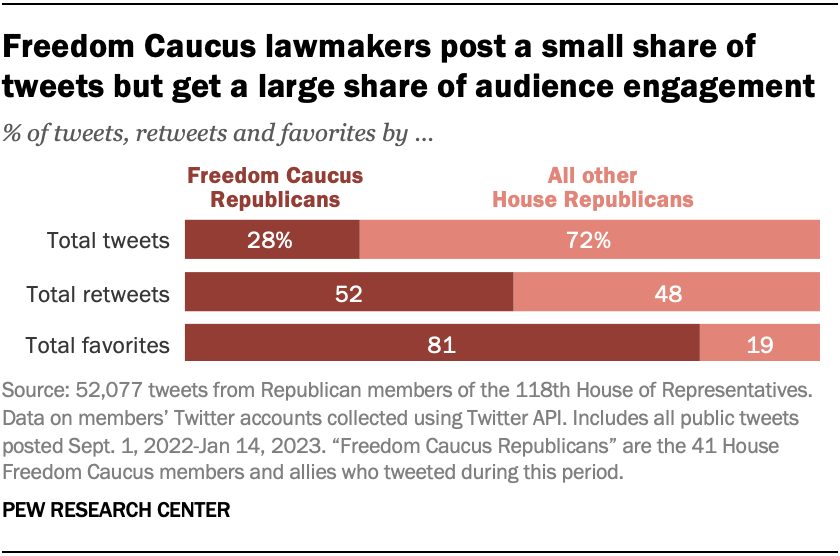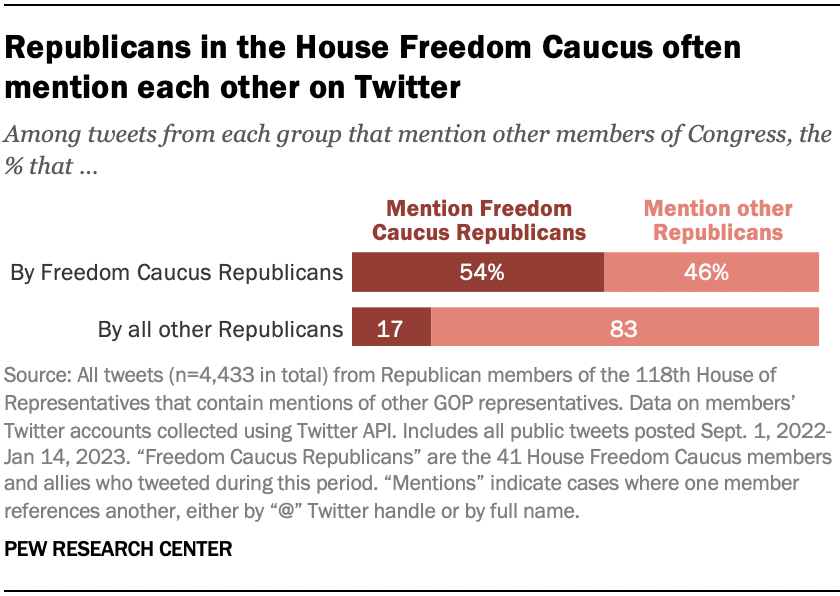The 118th Congress opened with a rare fight for the speaker’s gavel in the U.S. House of Representatives. After 15 ballots, Rep. Kevin McCarthy, R-Calif., emerged as the new House speaker, but only after he and his allies reached an agreement with a group of GOP holdouts, many of whom are affiliated with the House Freedom Caucus.
A number of lawmakers affiliated with the House Freedom Caucus have made social media a core component of their communication strategies. And a new Pew Research Center analysis finds that these GOP legislators use Twitter in distinctive ways. They are more likely than other House Republicans to use negative language and to address certain topics in their tweets, and they draw a disproportionately large share of all the audience engagement that House Republicans collectively receive on Twitter.
Pew Research Center conducted this analysis to understand how lawmakers affiliated with the House Freedom Caucus differ from other House Republicans in their use of Twitter.
Unlike other congressional caucuses, the Freedom Caucus does not disclose an official member list, although 16 current members list their Freedom Caucus affiliations on their official House websites, and various unofficial lists have circulated. Membership is by invitation only, and meetings are not public. For those reasons, it can be hard to distinguish between representatives who belong to the caucus and those who work closely with it but aren’t full members.
Pew Research Center compiled its list of House Freedom Caucus members and allies from a variety of sources, including members’ websites, the 2022 endorsement list from the caucus-affiliated House Freedom Fund, and published reports from reputable news outlets. For each member, we sought confirmation from at least two unrelated sources before adding them to the list.
To carry out the analysis of lawmakers’ tweeting patterns, researchers obtained from Ballotpedia a list of members of the 118th House of Representatives who also have a public-facing Twitter account. This included any official, campaign or personal accounts affiliated with each member. Researchers then collected all the tweets shared by those accounts between Sept. 1, 2022, to Jan. 14, 2023 (52,077 in total) and analyzed their content. For additional details, read the full methodology.

House Freedom Caucus members and their allies produced just 28% of all tweets from GOP House members between September 2022 and mid-January 2023. But their tweets received 52% of all retweets and 81% of all favorites received by House Republicans as a whole. On average, Freedom Caucus tweets received three times as many retweets and 11 times as many favorites as tweets from other House Republicans.
Tweets from the 49 members and allies of the House Freedom Caucus – 41 of whom had a public Twitter account and tweeted during the study period – tend to be substantially more negative than those of their Republican colleagues, the Center’s analysis shows. Nearly four-in-ten Freedom Caucus tweets (38%) used negative language, compared with 28% of tweets by other Republicans in the House. And when the Freedom Caucus goes negative on Twitter, audiences often reward them with increased engagement. On average, Freedom Caucus tweets expressing a negative sentiment received more than twice as many favorites as Freedom Caucus tweets that used neutral or positive language – and nine times as many favorites as negative tweets posted by non-Freedom Caucus Republicans.
Freedom Caucus members and allies are also more likely than other House Republicans to highlight certain topics on Twitter. For example, tweets about immigration and immigration policy accounted for 10% of tweets from Freedom Caucus members during the study period, compared with 7% of tweets from the rest of the GOP conference. Freedom Caucus members and allies also posted a larger share of tweets discussing government oversight or the need for investigations of federal agencies and the Biden administration (6%, vs. 4% among other House Republicans).
Other topics, meanwhile, are more widely mentioned by Freedom Caucus members and their allies than by other House Republicans. Around half of Freedom Caucus members and their allies who tweeted during the study period (51%) made at least one mention of LGBTQ+ issues – more than double the share of other House Republicans who did so (22%). And a substantially larger share of Freedom Caucus members and their allies mentioned issues related to free speech or censorship (68%, vs. 52% of other House Republicans).
Freedom Caucus Republicans are also marked by their widespread use of certain words and phrases, often related to prominent culture war issues. For instance, 41% of Freedom Caucus members – but just 13% of other Republicans – have used the terms “transgender,” “gender” or “pronoun(s)” in at least one tweet. And substantially larger shares of Freedom Caucus members used terms like “woke” (59% vs. 34%), “school choice” (24% vs. 6%) or variations on “critical race theory” (27% vs. 9%). Meanwhile, larger shares of Freedom Caucus members use terms like “invasion” and refer to migrants as “illegals” in their posts about immigration or refer to Hunter Biden or the “Biden family” in their tweets about oversight of the federal government and Biden administration.
As is true of their tweets using negative language, Freedom Caucus members and allies tend to get especially high levels of engagement relative to their peers when they discuss these distinctive issues. During the study period, Freedom Caucus members and their allies received more than 90% of all favorites of tweets related to LGBTQ+ issues – and 69% of all retweets of tweets about immigration.
The Center’s analysis also highlights the extent to which Freedom Caucus Republicans use Twitter to mention, amplify and endorse other members and allies of the Freedom Caucus itself.

Members and allies of the Freedom Caucus and the rest of the House GOP caucus mention other House Republicans on Twitter in a similar share of their tweets: in both cases, around 9%. But when they do mention House Republicans on Twitter, Freedom Caucus members are much more likely to mention other members of the Freedom Caucus itself. More than half (54%) of the instances in which Freedom Caucus Republicans mentioned other House Republicans referred to fellow Freedom Caucus members and allies. By contrast, just 17% of member references from other House Republicans mentioned members and allies of the Freedom Caucus.
Note: For more about this analysis, read the full methodology.